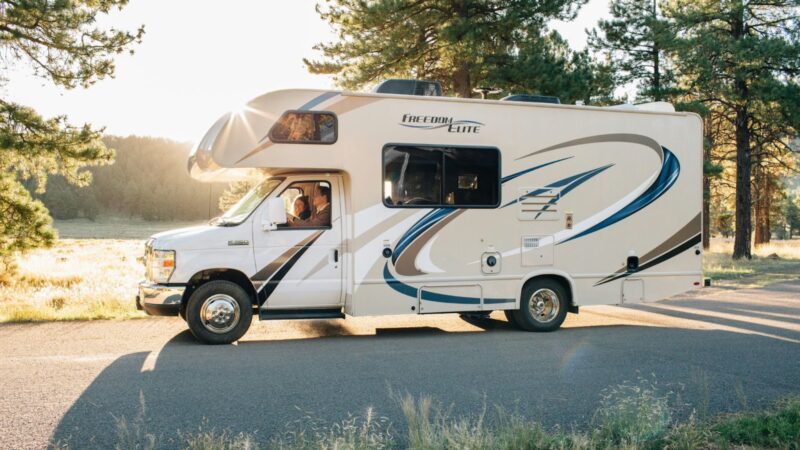Does RVing Impact Your Mental Health?

Is Your Mental Health Affected By RV Life?
RVing can be a great escape from the drudgery of everyday life. It’s a chance to get out in nature, explore new places, and spend time with your loved ones. But this lifestyle also comes with a price. Spending long periods of time out on the road can have a serious impact on your mental health.
Everyone craves stability in one form or another. And when you live in an RV, you won’t always have a reliable “home base” to return to if you get tired of traveling. Many people can develop feelings of loneliness, anxiety, depression, and more. Even if you don’t have a history of mental illness, it can still appear after long stretches of travel.
Fortunately, there are ways to improve your mental health during your RV adventures. It has never been easier to stay in touch with loved ones, travel the country, and refill any necessary prescriptions while you’re on the road. Below, we’ll discuss the mental health risks of RVing, as well as ways to counter these dangers.
Isolation and loneliness
One of the biggest struggles for RVers is loneliness. Many people travel with partners, family members, and friends, but even the largest RVs can only accommodate about eight people. No matter how introverted you may be, everybody needs people for companionship and comfort.
Even if you travel with a group, it might not feel like enough. Some travelers struggle with the feeling of being lonely, even when they’re around other people. It’s easy to feel cut off from other people as you travel from place to place. You can’t really put down roots and form a reliable community. You can’t even regularly visit outside groups like sports teams, church congregations, or clubs.
Solo RVers tend to struggle with loneliness the most, but it can affect anyone who travels frequently.
Stress
It shouldn’t surprise anyone to learn that stress is an everyday part of the RV lifestyle. You constantly need to make decisions, navigate confusing roads, and keep yourself and your RV safe. That doesn’t even cover the financial burden of dealing with gas, groceries, campground fees, and RV maintenance. All these little things can build up over time to create a huge mountain of stress.
The more strung-out you are, the more your health is going to suffer (physically and mentally). Stress can lead to disrupted sleep, eating disorders, heart problems, and more. You probably bought an RV so you could escape the pressures of life, but it’s still something you’ll need to deal with.
Lack of consistency
Another thing that can affect your mental health is the constant change that comes with RVing. It’s fun to travel around and get a change of scenery, but eventually, you might start to crave a regular routine and consistent surroundings.
The uncertainty of this lifestyle adds to your stress and can make you feel overwhelmed. Some RV parks won’t let you stay for longer than a few days, so it’s not always an option to take a breather.
Road rage
Finally, you’ll have to do a lot of driving as an RVer. Whether you’re behind the wheel or just watching out the window, you’ll notice plenty of annoying behavior from other drivers. It’s easy to fall into road rage when someone cuts you off or refuses to let you merge.
Road rage might feel cathartic in the moment, but in the end, it just adds to your pile of stress. You’re also more likely to get into an accident if you react in anger and begin to drive recklessly. The more time you spend in your RV, the more likely you are to succumb to the dangers of road rage.
How to improve your mental health on the road
As you can see, there are plenty of factors that can affect your mental health while you use your RV. Most of these will build up over time, so you may not notice them for a while. In other cases, you might have a rough initial adjustment to the lifestyle, but find that it gets easier the longer you go.
Whatever the case may be, there are things you can do to improve your mental health on the road. Forming regular habits and taking time for yourself works wonders!
Spend time outdoors
First things first, make sure you spend time outside every day! A lot of people are attracted to the RV lifestyle because they can spend more time out in nature. So be sure to take advantage of this perk.
Fresh air and sunshine can work wonders for your mental health. Although it may be tempting to watch TV in your dark, air-conditioned vehicle, try to spend at least a few minutes outside every day. It’s good to stretch, slow down your thoughts, and take in your surroundings.
Stay active
Next up, create an exercise routine for yourself. Physical fitness plays a huge role in your mental health. Unfortunately, it’s easy to slip into a sedentary lifestyle as an RVer. You tend to spend a lot of time sitting in your vehicle and driving.
So, every day, try to do something active. This will look different for everybody depending on your fitness level, age, weight, and other factors. But try to incorporate a mixture of high-intensity and low-intensity workouts. Stretches also help you relax and avoid cramps. Even just taking a stroll around your campground every day can help immensely.
Maintain relationships with other people
Loneliness can strike at any time, but you can counter it with help from other people. You might travel with a group, but be sure to maintain relationships with people outside your circle as well. Try to stay in touch with distant family members and friends. Schedule remote game nights or other fun activities.
You should also keep an open mind about meeting new people. Lots of RV parks and resorts will host community events for guests. You can participate in fun activities and maybe even make some new friends. Don’t let isolation overwhelm you! Reach out to old friends and try to make new ones wherever you go.
Stay in a long-term RV park
The constant bustle of RV living can wear on anybody after a while. It’s exhausting to always be on the move. So sometimes, you might want to settle down for a few weeks to catch your breath.
There are plenty of long-term RV parks and campgrounds where you can book an extended stay. Some places even let you camp for the entire year (although these are harder to find). When the stress of RVing starts to feel like too much, find a calm campground where you can rest and reset. Search RV LIFE Campgrounds to find the right long-term RV park for your specific needs.
Keep taking your prescription medication
Plenty of people need medication to regulate their mental health. There’s absolutely no shame in this, and it’s wonderful that there are so many available treatment options. However, you need to ensure that you refill your prescriptions and continue to take them on a regular schedule. Your meds won’t do you any good if you stop using them! Check out our article on “How Can Full Time RVers Get Medications?” for more tips.
Try remote therapy
Finally, try to access mental health services if you need additional support. There are lots of telehealth options nowadays, and plenty of therapists are willing to work remotely. It can be enormously comforting to have a professional to talk to when life feels overwhelming.
If you would like to explore online therapy options, try trusted avenues like BetterHelp, ReGain, or Calmerry. There are also more specific therapy providers who focus on teenagers, couples counseling, religious-centered therapy, LGBT support, and more. No matter what you’re struggling with, there’s someone out there who can help.
Talk with fellow RVers online
One of the best parts about RVing is engaging with the community of traveling enthusiasts. iRV2 forums allow folks to chat with other RVers online, and get other perspectives on everything RVing, including products, destinations, RV mods, and more.
Related articles:
- 4 Simple Ways To Reduce Your Travel Day Stress
- Solo RVer Clubs Take The Lonely Out Of Alone
- Three Steps You Can Take To Decrease Your Risk for Dementia
The post Does RVing Impact Your Mental Health? appeared first on RV LIFE.







